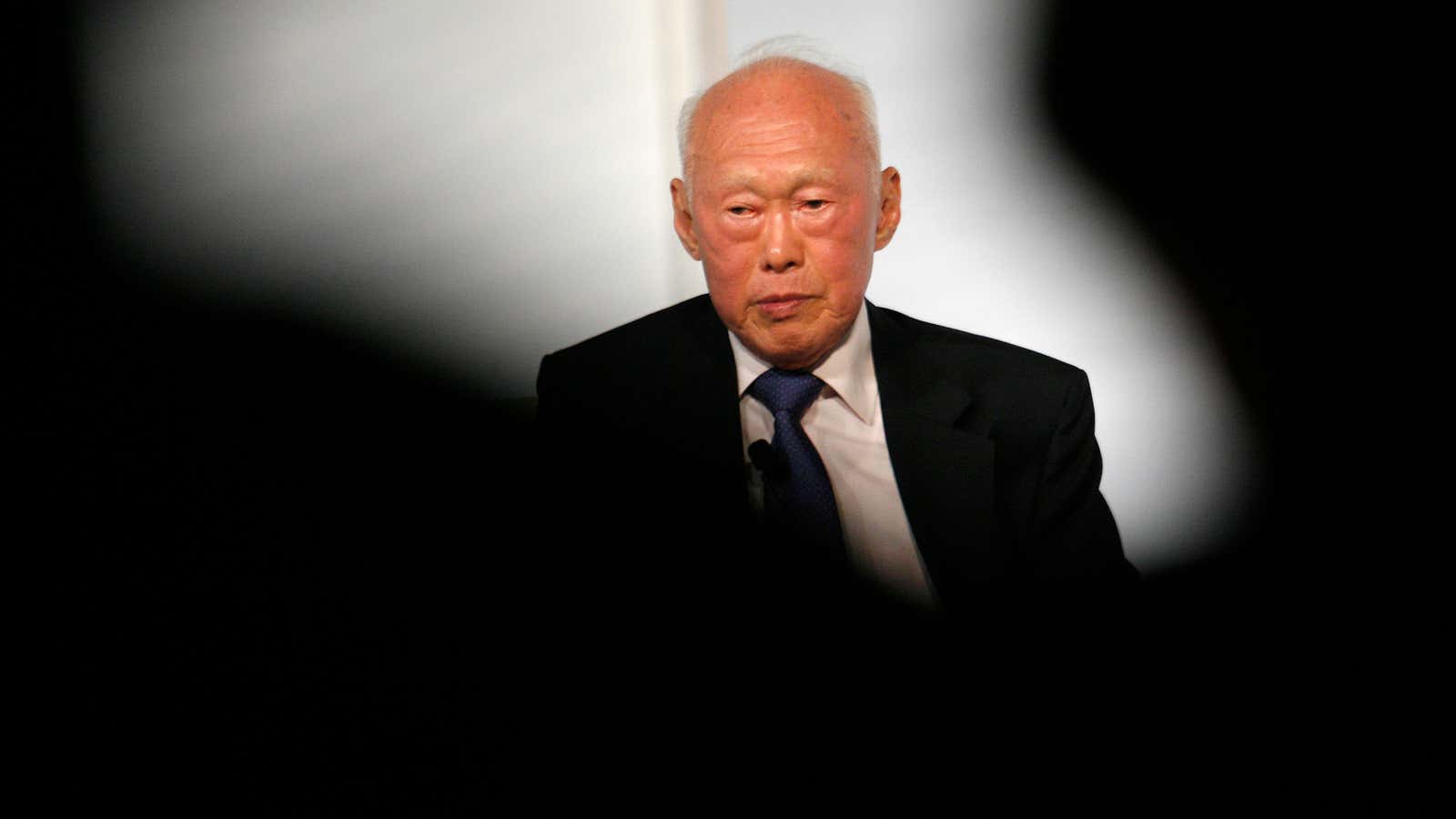Growing up in Singapore, the ideals of liberal Western democracy were not held in the same high esteem as they are in the US. “The exuberance of democracy leads to undisciplined and disorderly conditions which are inimical to development,” Lee Kuan Yew, Singapore’s first prime minister, is often quoted as saying.
On Nov. 8, Americans head to the polls for one of the biggest tests of democracy’s efficacy in the past several decades. On the cusp of this massively important presidential election, I’ve been thinking a lot about my home country and the ways it has shaped my own understanding of government, for better and for worse.
The Singapore of the 1980s, the country my parents immigrated to from India, was a sleepy, if efficient, backwater. After experiencing first-hand the remarkable successes of Lee’s system, I found myself buying into his rhetoric as well. Maybe democracy, in all its chaos, truly was at odds with progress.
Lee’s longstanding disdain of Western democracy’s “individual rights” seemed similarly prescient when I left home to study politics in London. I was quickly homesick for my cushy life back in Singapore. What good is unfettered free speech in a country where a third of the population fell below the poverty line between 2010 and 2013? You may argue that it’s unfair to compare England with Singapore, as Singapore doesn’t even have an official measure of poverty. But as a female college student, I was more concerned with the things I had taken for granted in Singapore, such as being able to go home alone at night without fearing of my safety.
A move to the United States a few years later only strengthened my anti-democratic attitudes. I encountered glaring gender and racial bias. My parents warned me about “getting shot if I ever got into an argument with anyone.” So this was America, the heralded land of the free, where democracy meant being unable to keep guns out of the hands of criminals. By privileging the rights of the individual, the collective safety of society seemed at risk. Lee’s words echoed in my ears often, even as I obtained a Master’s degree in journalism.
One of my first jobs as a journalist was in India, a nation often dubbed the world’s largest democracy. There, I was met by rampant corruption, an unreliable legal system, and some of the most extreme forms of misogyny I had ever encountered. This “for the people, by the people” ideal was seeming harder and harder to achieve in real life.
I’ve now lived outside of Singapore—on and off—for nearly a decade. And I can see now that my upbringing warped a lot of my worldview. Much of the romanticism I have long harbored for my home has given way to insight. Singapore’s story is truly a unique one. It’s a historical aberration, bolstered by a type of authoritarian yet benevolent governor that the world may never see again.
Indeed, the current prime minister is now being forced to deal with problems his father never had. Despite its impressive wealth, many young Singaporeans cannot afford to buy their own homes. Meanwhile, the lack of a welfare system had led to a massive wage gap. Culturally, though not racially homogenous for many years, an influx of immigrants has spurred a loud, virulent xenophobia. In many ways, Singapore has finally become more like the rest of the world.
Which brings me back to the historic election in the US. Americans are finally realizing that power doesn’t always equal competency. The Founding Fathers’ idealist vision also created and perpetuated systems that bolster the majority, while purposefully suppressing the minority.
On the one hand, eight years ago Americans elected a black president—and then re-elected him—in a beautiful testament to the positive, progressive aspects of modern democracy. Equally affirming was the election of London’s first Muslim mayor, Sadiq Khan, who is now tasked with healing the nativist divides gouged by Brexit. Meanwhile, in Singapore, I know the racial and economic majority will continue to rule until space is intentionally created to include all voices.
On the other hand, US presidential candidate Donald Trump embodies all the problems I was taught to associate with democracy while I was growing up. As British satirist Alan Coren once said: “Democracy consists of choosing your dictators, after they’ve told you what you think it is you want to hear.”
Indeed, Trump’s racist, misogynistic rhetoric has taken flight against the backdrop of real discussions about race, inequity, and poverty in America. This is democracy in all of its messy, complicated, chaotic glory. Lee Kuan Yew would have hated it. But it is precisely these kinds of unpleasant conversations that my beloved home has shied away from years. And I’m no longer sure that Singapore’s state of denial is working.
Over to you, America.
